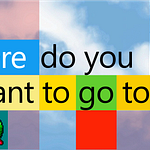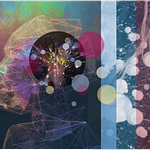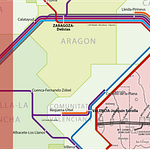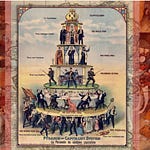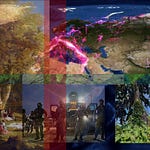Hello Interactors,
I asked you last week how you get your groceries. It led to some good discussions! Thanks to all who contributed to the poll and left comments. This question was prompted by recent local events in my town around why more people don’t walk to shop when they can. But it raised bigger questions in my mind about how other animals seek food and how we’re different. It turns out our brains have evolved to work nearly 99% like rats and raccoons. And those living in a city may have an edge over country folk.
As interactors, you’re special individuals self-selected to be a part of an evolutionary journey. You’re also members of an attentive community so I welcome your participation.
Please leave your comments below or email me directly.
Now let’s go…
CITY SLICKERS AND COUNTRY BUMPKINS
We have an outdoor camera that sometimes captures nighttime activity of our animal neighbors. A mouse here, a rat there, here a rabbit, there a rabbit, everywhere a rabbit, rabbit. Recently the camera caught our racoon friends sniffing around. Cute little things, and crafty too.
I mentioned my encounter with raccoons in week one of Interplace two years ago. They were politely rolling back the turf on our lawn in search of grubs…which were happily feasting on the roots underground. I would roll the turf back in place and a few days later those little rascals would pull it back again. I installed a sprinkler with a motion detector to scare them away. That worked for a while.
Until one evening I heard the sprinkler go off. I ran to see if I could spot them. There one of them sat perched on their haunches, arms to their sides staring at me in the doorway. Water was dripping from their perked ears, un-phased by the staccato rat-a-tat-tat beat of the oscillating sprinkler. A nice moisturizer for their furry frocks. Spa day in the lawn. Made complete with earthly scented, protein-packed pupae. I removed the lawn, and with it the grubs, but the raccoons still come sniffing for a snack.
Raccoons are notoriously smart critters. And these raccoon visitors, and their family and friends, are getting smarter the more my sleepy suburban town of Kirkland, Washington becomes increasingly urbanized. Comparative psychologist Suzanne MacDonald at York University in Toronto studies the behavior of raccoons. She hopes to uncover ways for us to coexist. She conducted a multiyear project tracking raccoons with GPS-collars in urban and rural settings. One location was in an area that had overlapping travel boundaries for both rural and urban raccoons.
She baited two different containers. One was a container familiar to both city and country coons – a trash can with a bungie cord securing the lid. The other was a novel container to both – a bucket suspended 30 cm above ground by ropes tied to nearby trees. What she found surprised her. Both the rural and urban raccoons were able to deplete the weird hanging bucket with ease. The situation may have been novel, but once they got to the bucket it was relatively easy to extract the food. But the trashcan, while more familiar, proved to be a problem for rural racoons.
She recorded 17 of the 22 urban raccoons successfully consumed the contents of trashcan, but not one rural racoon could successfully rid the familiar trashcan of its bungie cord despite multiple attempts. The urban raccoons demonstrated they were better at experimenting, iterating, and manipulating the can. This was as true for males as females, old and young – as young as five or six months old. She speculates that “Persistence, neophilia [the love of new things], and high levels of exploratory behavior may result in increased survival and reproduction in the urban setting, and thus we may be observing cognitive evolution in action in this species.”1 Cities, it seems, have made them, and their offspring, smarter. Which could explain why they continue to flourish in the face of increasing human induced urbanization and climate change while extinctions of other species grow by the day.
Ok, fine, we’re talking about racoons. What about humans? Yep, similar evidence has been found for humans. Educational psychologists recently conducted a study in Brazil between rural and urban children comparing cognitive abilities. They found both wealthy and poor kids from urban areas scored better on two separate intelligence measures than poorer kids from rural areas.2 They didn’t have sufficient data to make claims about heritability and admit the small sample size doesn’t make the findings conclusive, but they did confirm what is already known about the brain. The more novel experiences it encounters, the more capable it becomes at dealing with them. City raccoons, like human city dwellers, are exposed to more novel situations and volatile environments. It seems they’re cognitively, and possibly evolutionarily, rewarded for it.
My sprinkler was no match for those silly, city raccoons.
A CAT IS A CAT IS A CAT
Our senses are feeding our brain an incomprehensible amount of information as we interact with people and place. Brains are like a biological statistical learning machine making inferences based on cascading levels of probability of risk and reward. It’s seeking a path with the fewest surprises as a way of optimizing performance and survival amidst an environment of infinite variability. An environment for which it is tightly coupled. Our brain actively constructs a model of the environment for which is exists; against which it infers probabilities for survival in a myriad of situations over space and time and then stores the information in DNA.
These neural inferences are happening constantly in the background of our lives so often and so quickly we’re not even conscious of them. The neuroscientist John Krakauer offers examples in the form of anticipatory postural adjustments – small micro movements our body makes in anticipation of situations our brain has inferred on our behalf.
He says,
“I can have you hold onto a handle and just crouch while holding onto it and then unbeknownst to you, suddenly the handle will pull on you and you'll have a very quick intelligent, reflective response to stay from falling over.”3
“Now I put a cup of coffee in your right hand and do the same thing. Your very short latency reflective response will take into account that you're holding a coffee cup in your right hand and your quick reflective anticipatory postural adjustment will be intelligent and will change in the context of having that conversation. You have no conscious idea about what you just did. You have no concept that you did it, you have no conscious awareness of it, but you made a flexible adjustment that was very intelligent.”
But Krakauer believes the human brain is more than just an advanced statistical reasoning mechanism. He agrees our brain shares similar control of our biomechanical structures as other animals. And he admits the brains of a mouse, rat, rabbit, or raccoon are all just as miraculously marvelous, cunning, and adaptable as the human brain. However, he also believes we are distinct from every animal on the planet. He said,
“…if you are a cat in Istanbul and you are a cat in Boston, you basically look exactly the same. You do very similar things. There may be some adaptations, but a cat is a cat. Whereas humans can be trapeze artists, they can be machine learning programmers, they can be composers.”
He believes some mutation in our brains occurred in our evolution, and we don’t know what, where, or when it happened. He doubts we ever will given none of the species of humans that connect us to primates survived. But something enabled us to dominate the animal world; harness, hoard, and destroy resources – and potentially slow or accelerate our own extinction. That certainly would make us unique to other animals.
As Krakauer says,
“you can be intelligent in many different ways using really smart dumb algorithms that get 99% of the lifting required to exist on this planet…”
But what about that 1%? There’s a lot packed into that tiny fraction of difference in humans that makes our behavior so bewildering. It’s what keeps rats, he demurs, from “ever having to do podcasts, write books, and send probes up into space.”
LAZY RATS
It’s easy to imagine the probability algorithms at work as those rural and urban racoons wrestled with that garbage can. Curiosity, the attraction to novelty, can get one in trouble, but it also has its rewards. Rewards help teach us and condition us to behave in particular ways. The classic rat and pigeon experiments of the 1960s and 70s by the behaviorist B. F. Skinner taught us the principle of reinforcement – that future behaviors can be reinforced and even strengthen when a certain action is rewarded.
Skinner, and many others since, showed rats are more willing to pull a level many times, or harder, or longer, to get a reward than feast from a free buffet. It’s the same mechanism at work in game design, gambling, and other addictions – like drugs. Or those little icons that count your likes and number of new emails in your inbox. Stimulus, response, reward, repeat. How addictive.
It made me wonder how hard we work for our food. My shabby little survey last week revealed 53% of 34 Interactors drive a car for their food. Another 32% walk, 9% take a bike, and 6% find another way. Nearly three quarters of these respondent’s report living less than one mile (1.6 km) from a grocery store. That’s roughly a twenty-minute round trip walk for an able-bodied adult without many hills, wind, sleet, snow, or heavy items.
I then asked why drive when one could walk? Sixty-seven percent (~23 of 34) said they include grocery shopping with other car trips. And 22 percent clicked my cheeky choice claiming they are ‘lazy.’
That choice got me in trouble with my former statistics professor. He commented, “Oh dear, Brad, I guess I should have taught you a little better on survey design. I'm lazy? Talk about a loaded question!” Loaded indeed. I asked him to expand on why such a question is loaded. He’s written many academic papers on exactly why it’s hard to pin down travel choice behavior.
He said, “so much depends on individual attitudes, perceptions, beliefs.” Right there we see three words raccoon, rat, and cat researchers don’t (yet) deal with. He notes, “These [elements] are hard to observe and can vary from individual to individual in ways that are not necessarily correlated with the easily observed things like age and income of the traveler, and cost and time of the trip.”
But there’s more…
“Layer in constraints that are in theory observable but in practice costly to collect – and that vary in a chaotic fashion from trip to trip and day to day…” Much travel choice research also relies on surveys that require participants to recall or predict their behavior…both of which are notoriously flawed and often inaccurate.
But then he gets into what I think is a particularly stubborn trait of humans – “the effects of habits that are hard to dislodge…” My professor admitted to driving to get groceries when he could walk or bike. Clearly, he didn’t choose ‘lazy’ on the poll, and he rightfully should not. He has good reasons for using a car and they’re probably shared with many other people.
Car drivers can sometimes get cast as being lazy. If given the choice of acquiring food with least effort, why not take the car? But wait, what about rats preferring to work for food? They surely wouldn’t take a car if given the choice, right? Wrong.
Researchers out of Virginia found that rats trained to take a custom-made car to get food were less stressed than those who did not.4 It was even more calming for driver than the passenger. They also found the only rats successful at achieving this task were raised in a more complex environment, complete with more novel environmental stimulation — like a city.
Researchers wondered if these rats were getting the same satisfaction from learning a new skill, we humans get. A reward in the form of satisfaction, stress reduction, and what psychologists call agency – the ability to read a situation and make decisions that best suit your goal.
A human’s choice to drive requires money. The act of driving is lazy compared to the labor required to own or rent one. Forget for a second the effort of learning to drive. Even a rat can learn to drive. Consider instead the amount of work required to amass the necessary money to purchase, own, operate, insure, and store a car. That says nothing of the labor required to build it and repair it. Or consider the labor needed to build the infrastructure required to operate it. The labor of first responders called to the scene of horrific collisions.
That is a lot of lever pulling for the reward of private car ownership. It’s hard to call car owners and drivers ‘lazy’ given how much labor goes into owning and operating them. And this says nothing of the satisfaction amassed in the social status or the pleasure of being propelled through space with little to no effort.
I suspect the more the car is used, the more reinforced the behavior becomes. Heck, it may even become an addiction. I, for one, have found the less I use my car the less rewarding it is to own or drive one. I admire them, use them when I need to, and remind myself of the privilege to own and drive one. But the less I drive, less rewarding it is. I’d rather walk if I can. As an urban animal walking, I encounter more novel situations, more environmental stimulus, and thus more cognitive stimulation. Just like a rat, I have agency. It’s making me smarter, right? I think not, I can’t even out smart a raccoon.
Comparative Cognition Outside the Laboratory. Suzanne E. MacDonald and Sarah Ritvo. 2016.
Mothers-Offspring Resemblance in Intelligence and Its Relationship to Socioeconomic Status. Flores-Mendoza, et. al. 2017.
John Krakauer Part 2: Learning, Curiosity, and Consciousness. Complexity Podcast. 2022.
Scientists have trained rats to drive tiny cars to collect food. New Scientist. Alice Klein. 2019.







